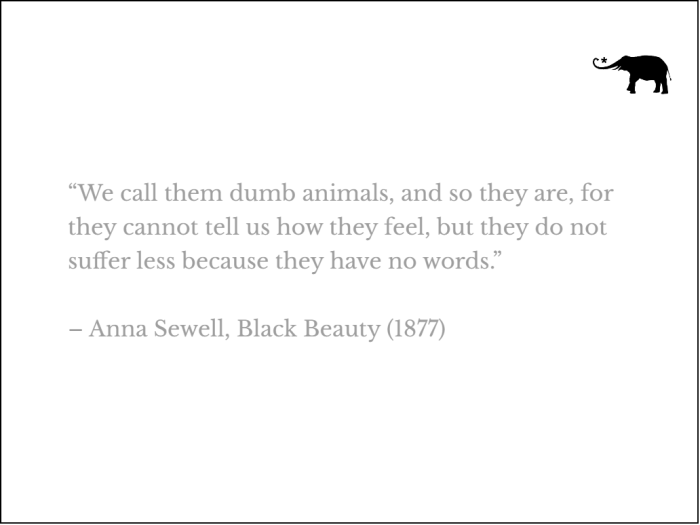“We call them dumb animals, and so they are, for they cannot tell us how they feel, but they do not suffer less because they have no words.” – Anna Sewell, Black Beauty (1877)
A few weeks ago, my 8 year old daughter announced to our family that she had opened a library in her bedroom, organised into categories to appeal to each individual member of the household. When it came my time to ‘borrow’, she excitedly revealed the carefully selected pile of books she had created just for me. Sitting at the very top was a special book that I had not seen or read since childhood, and although this was a modern version of the acclaimed classic, I still felt like I had stepped back in time through the eyes of the animal that adorned the front cover. I immediately signed my name in the little hand-drawn register to the glee of my daughter, and started reading it later that night.
Anna Sewell’s Black Beauty was the beloved book from my childhood, written from the point of view of the horse itself in the industrially developing England in the 1800s. During this time horses played a major part in toiling in the mines, pulling barges, and were essential for transportation. They were often considerably mistreated, beaten and starved, with many horses known to have died of exhaustion whilst still tied up in their harness.
“Oh! if people knew what a comfort to a horse a light hand is, and how it keeps a good mouth and a good temper, they would surely not chuck, and drag, and pull at the rein as they often do.” ― Anna Sewell, Black Beauty
I had not realised that Sewell had herself suffered when, at the age of fourteen, she had an accident with her leg and it never recovered, deeming her disabled for life. This new knowledge made me realise how much she must have resonated and empathised with the horses who experienced broken knees and incapacitated legs at the hands of their ‘grooms’ and owners, often leading to early death or a life as a cab horse, considered one of the lowest and toughest roles for a horse to take on during these times. Indeed the very story was inspired by the abusive treatment that Anna herself witnessed of a horse suffering at the expense of its owner. It was not until the final months of her life that the book was published and sadly she did not live to see how successful her story became.
From John Manly to Jerry Barker, Ginger to Merrylegs, I felt enchanted and emotional all over again by this story of Black Beauty as he moved through a life determined by human needs and greed. From the joy of the paddock as a colt to the pain of the ‘bearing rein’ (which use was later abolished due in large part to the awareness brought to light by this book), this horse’s biography offered such insight into the life and plight of animals in such a unique and imaginative way.
From no deliberate planning on my own part, I happened to finish Black Beauty on the eve of Internationally recognised World Animal Day. This day is celebrated around the globe every October 4th and promotes peaceful coexistence between animals and humans and making this world a safer place for animals. It also reminds us of how animals enhance our lives.
As I read the final paragraph, I thought to myself how proud author Anna Sewell would be of the creation of such a day, and how the story of Black Beauty told in the first person by the animal himself indeed seemed to be the perfect example of the key themes woven into each yearly celebration.
The innocence and vulnerability of animals, their dependence on human beings for protection, and their yearning for our understanding of their real needs.
If only we would listen. Deeply. Honourably. And without want for anything in return.
Willie always speaks to me when he can, and treats me as his special friend. My ladies have promised that I shall never be sold, and so I have nothing to fear; and here my story ends. My troubles are all over, and I am at home; and often before I am quite awake, I fancy I am still in the orchard at Birtwick, standing with my old friends under the apple trees. THE END.












Read 0 comments and reply